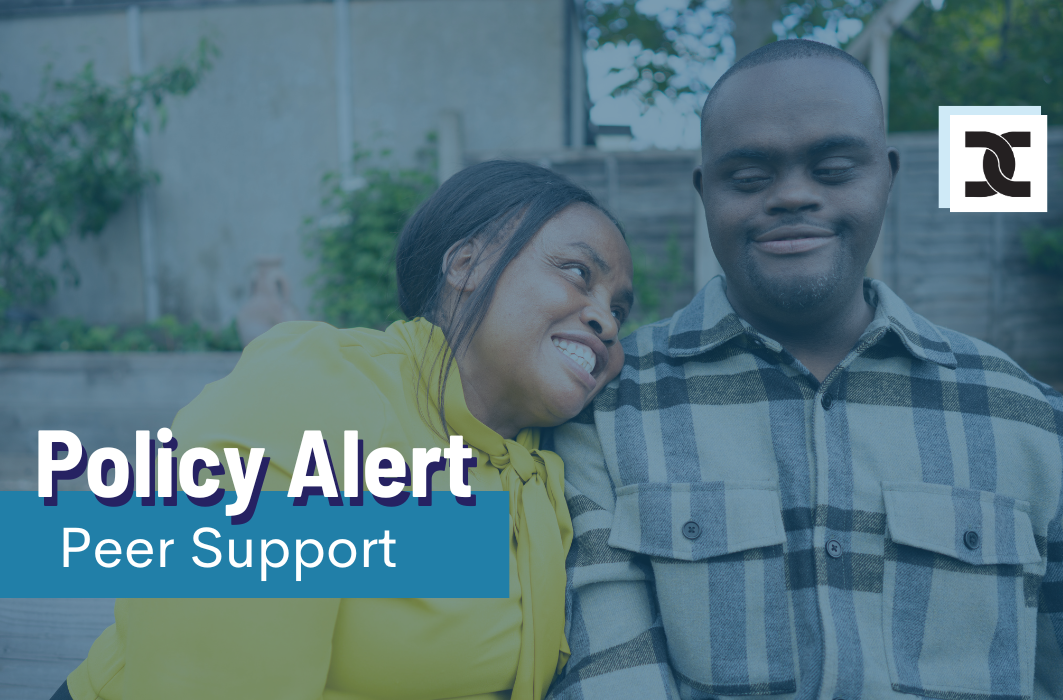A new bill has been introduced in Congress called the PEERS in Medicare Act. This legislation would help expand peer support services through the expansion of Medicare billing. Learn more about why these services matter and how peer support could become available to more people through this legislation.
Peer Support for Mental Health
Peer support workers provide lived experience with mental health and substance use challenges to support recovery and healthy living for those with similar experiences. Evidence has shown that peer-to-peer support is an effective, safe, and cost-effective intervention that helps promote empowerment and patient activation, while decreasing the need for unnecessary hospitalizations.
There is great public concern for growing mental health challenges nationwide. Current trends show that 64.5 million nonelderly adults across the US currently have a mental health or substance use condition. In 2022, over 20% of this population had symptoms of anxiety and/or depressive disorders but reported being unable to gain access to mental health counseling or therapy. According to the Kaiser Family Foundation, substance use-related mortality rates increased by 50% from 2019 to 2021 and have disproportionately impacted people of color. What are understood broadly as “deaths of despair” from suicide or drug and alcohol overdoses have risen across racial/ethnic groups, with notable increases among American Indian, Alaska Native, and Black individuals particularly during the COVID-19 pandemic.
The use of peer support in adult mental health services can offer consumers trusted support in their recovery from providers who may acknowledge and validate the difficulties experienced navigating more traditional healthcare services. The likelihood of positive mental health outcomes is increased when effective and consistent support is made possible. A 2019 brief from Mental Health America found that peer support helped reduce re-hospitalization rates, days inpatient, overall cost of services, while increasing the use of outpatient services and quality of life outcomes. Peer supporters can help engage or re-engage those into seeking support in their recovery, particularly for harder to reach populations like people with disabilities.
Peer-to-peer support has been recognized internationally by the World Health Organization to be highly effective in helping those with mental health and substance use challenges. Major public health organizations such as SAMHSA, CMS, and the Veterans Health Administration have all agreed on the favorable use of peer-to-peer support. Notably, the Substance Abuse and Mental Health Services Administration (SAMHSA) points to peer support as a best practice in mental health crisis response, including for conversations around suicidality. Peer workers can help alleviate distress for those in crisis by demonstrating that recovery through difficulties is possible, especially when those workers represent the communities served. Recovery might mean different things to different services users, whether “the ability to live a fulfilling and productive life despite a disability” or “the reduction or complete remission of symptoms” so that people can participate fully in their communities.”
Guidelines developed by the National Association of Peer Supporters (NAPS) emphasize that workers share “relevant elements of one’s own personal story to connect with someone else.” They also lead with core values of offering care voluntarily to people, through an approach that is strengths-focused, facilitates change, and is driven by the person seeking support.
Health Insurance Coverage for Peer Support
Access to peer support is primarily offered to healthcare providers that bill through the Centers for Medicare and Medicaid Services (CMS). As of 2022, 39 states offer coverage through Medicaid for behavioral and mental health peer support services. Over 43% of nonelderly adults with disabilities rely on Medicaid in some way. Of Medicaid recipients, people with disabilities face compounded barriers in obtaining access to reliable mental health therapies and counseling and are more likely to seek these services.
As of 2022, there were 7.7 million people under the age of 65 that had a disability and were covered by Medicare, which constituted about 12% of all Medicare beneficiaries. Under the PEERS in Medicare Act, coverage for peer support services would be made available under Medicare Part B. Medicare Part B typically provides medical insurance that covers doctor’s visits, outpatient care, home health care, durable medical equipment, and preventative services to those aged 65 and over.
PEERS in Medicare Act
The PEERS in Medicare Act would help more health providers offer peer support services that would be covered by Medicare. This would allow federally qualified health centers, rural health clinics, community mental health centers, and certified community behavioral health clinics to offer these services. Additionally, Medicare providing coverage for peer supports could pave the way for private insurance to add similar coverage of these services in private insurance plans.
AAHD and the Lakeshore Foundation have joined 46 national organizations, led by the Mental Health Liaison Group (MHLG) peer support work group, supporting legislation to strengthen peer workers in Medicare payment (S. 3498 and HR 6748). Read these letters here.
This statement was co-authored by Nuria Piracha and Michelle Sayles.
